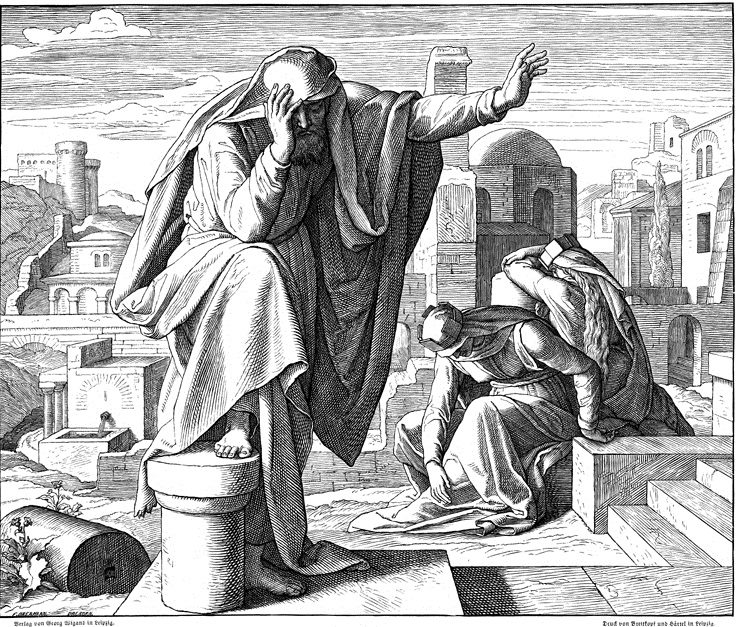Lamentations
Introduction
 This book’s author is unknown, but there’s good reason to presume it was Jeremiah. It was read on the annual fast for Jerusalem’s destruction from as far back as anyone could remember, in the hope that future generations of Hebrews would not repeat the wickedness of their ancestors. The five chapters are five separate laments or dirges. Please refer to these resources as well: this commentary, the NETS Bible, and this LXX Interlinear.
This book’s author is unknown, but there’s good reason to presume it was Jeremiah. It was read on the annual fast for Jerusalem’s destruction from as far back as anyone could remember, in the hope that future generations of Hebrews would not repeat the wickedness of their ancestors. The five chapters are five separate laments or dirges. Please refer to these resources as well: this commentary, the NETS Bible, and this LXX Interlinear.
Lam. 1-2
Using the analogy of a betrayed and abandoned woman, Jerusalem is described as a once-prominent and delicate lady whose friends and lovers have all forsaken her. The nation of Judah had chased after any and every nation that offered hope of escape from the wrath of God, only to earn more of it for their efforts. Not only have those nations not helped, they actively sought to harm.
So now the whole nation is in exile, away from the peace of God, while the Promised Land lies in ruin and desolation. On top of that, their enemies mock and gloat over their demise, but the nation as a whole had asked for it. Their repeated rebellion against God earned them the wages they were finally being paid.
The text goes on to describe their shame in the crudest terms, and the people knew that the reason they had to watch helplessly as their precious temple was robbed was because they had pushed God too far. After describing all this in the third person, the text then speaks from the nation’s perspective. But they really had no right to complain, especially since on many occasions God relented from punishing them because they said they were sorry, only to go right back to their wickedness. You can read through the rest, and the NET Bible has helpful headings that show who is speaking at a given point.
Lam. 3-5
Even after describing a life of darkness and despair, “the prophet” still clings to hope in God and advises patience for those suffering for no reason. It’s easy to have faith when things go well, but faith is only really tested when it seems God is far away. As Christians, our faith must be rooted in an unchangeable fact: that Jesus rose from the dead. If it’s based on anything else, such as experiences or feelings, it will fail when we need it most.
We must also be very careful not to ascribe to Satan the acts of God, which as Jesus said in Mat. 12:31-32 is an unforgiveable sin. The people of Judah had called Jeremiah a traitor for speaking of God’s judgment of their sins, but Christians today often do the same thing. Any diversion from their opinions is deemed satanic, which is slander against fellow believers and the Holy Spirit who indwells them. The descriptions of judgment in this book and Jeremiah should serve as warnings to us today, not to do as they did.

